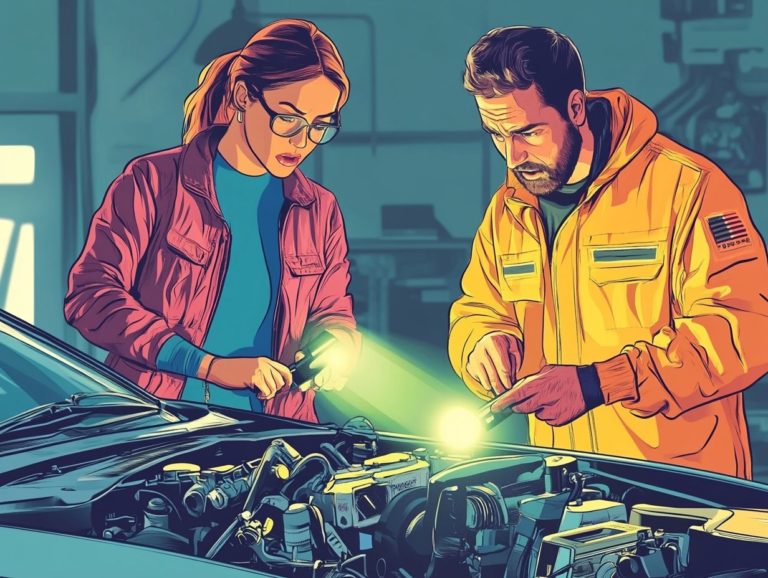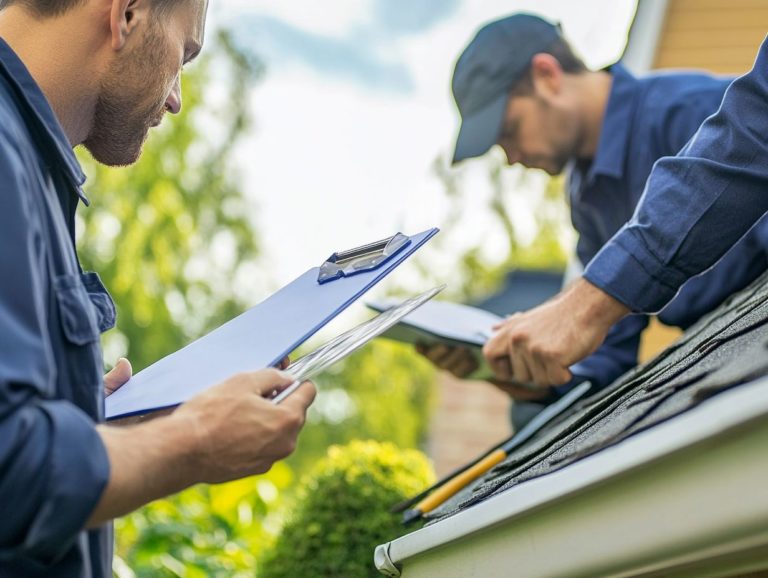How to Find Reliable Used Car Sellers
Finding a trustworthy used car seller can seem overwhelming. But rest assured, with the right strategy, it s well within your reach.
To ensure a wise purchase, follow these essential steps:
- Leverage online resources.
- Gather personal recommendations.
- Evaluate the seller’s reputation.
- Verify the vehicle’s history.
- Conduct meticulous in-person inspections.
Don’t overlook the importance of negotiating a fair price and finalizing the deal effectively.
Get ready to drive away with confidence! Let s embark on this journey!
Contents
Key Takeaways:
- Do thorough research on used car sellers through online resources and recommendations to find trustworthy options.
- Assess the reputation of the seller by checking customer reviews before making a purchase.
- Verify the vehicle history, which is a record of everything that has happened to the car, including previous accidents or repairs.
Researching Used Car Sellers
Researching used car sellers is a crucial step in your car-buying journey. Learning how to use online reviews for used cars ensures that you make informed decisions about the quality and reliability of the vehicles you’re considering.
Whether you re eyeing a dealership or an individual seller, using platforms like CARFAX, Cars.com, Carvana, Edmunds, CarMax, and TrueCar will give you invaluable insights. You will understand seller credibility, available inventory, and competitive pricing.
Online Resources for Finding Sellers
Online resources have revolutionized how you research used car sellers. You can gain instant access to a vast array of options and valuable information with just a click.
Platforms like Cars.com and Carvana make your search simple. You can read customer reviews to assess the reliability of sellers and their vehicles with ease.
These platforms also allow for smooth pricing comparisons. This helps you uncover competitive deals without the hassle of hopping from dealership to dealership.
Using CARFAX reports elevates your buying experience further. Understanding a vehicle s history is crucial for making informed decisions.
With these powerful tools, you can confidently navigate the used car market! You ll make choices rooted in transparency and clarity.
Asking for Recommendations
Asking for recommendations from friends, family, or trusted sources can greatly elevate your search for reputable used car sellers. Additionally, checking out the best websites for finding used cars can provide valuable insights. Personal experiences often shed light on vehicle quality and seller integrity.
Paying attention to customer reviews on platforms like Trustpilot and the Better Business Bureau (BBB) enhances your decision-making process. These ratings give you a clear view of buyer satisfaction levels.
By relying on firsthand accounts and trusted reviews, you ll cultivate a well-rounded perspective. This enables you to navigate the used car market with greater confidence and assurance.
Assessing Seller Reputation
Assessing the reputation of a used car seller is essential for a positive purchasing experience. It helps you avoid potential headaches down the road, such as vehicle issues, fraud, or misrepresented conditions.
Using customer reviews, Trustpilot ratings, and Better Business Bureau (BBB) ratings can offer a comprehensive overview of a seller s credibility. This empowers you to make informed decisions.
Checking Reviews and Ratings

Checking reviews and ratings is crucial when evaluating the reputation of used car sellers. It provides you with invaluable insights into the experiences of previous customers.
Check platforms like Trustpilot and the Better Business Bureau (BBB) to understand how sellers operate. It s essential to sift through numerous reviews to pinpoint real feedback; look for detailed accounts that describe specific transactions instead of vague praises or complaints.
Pay close attention to patterns in both positive and negative experiences. This balanced perspective can reveal key strengths and weaknesses of the seller. Be wary of overly enthusiastic testimonials or a flood of similar reviews appearing in a short timeframe. These may suggest fraudulent activity.
Having a well-rounded view gives you the power to make informed decisions and navigate the used car market with confidence.
Investigating Any Red Flags
Investigating any red flags while searching for used car sellers can save you from potential pitfalls and costly mistakes down the road. To make the best choice, consider following a guide on how to prepare for buying a used car, which helps ensure you end up with a reliable vehicle.
Pay close attention to common indicators that might hint at deeper issues, like frequent changes in ownership. This could suggest dissatisfaction or hidden problems lurking beneath the surface.
Being aware of visible signs of damage or past accidents gives you valuable insight into how the car has been treated over its life. Another critical aspect to consider is whether there are any unresolved open recalls that could impact the vehicle’s safety and performance.
By conducting thorough mechanical inspections, you can better assess the true condition of the car. This diligence helps you make informed decisions, guiding you toward a more dependable purchase.
Verifying Vehicle History
Verifying the vehicle history is an essential step in your used car buying journey. It provides crucial insights into the car’s past, including any damage or accidents it may have encountered.
Use the Vehicle Identification Number (VIN), a unique number that identifies your vehicle, to access comprehensive vehicle history reports. These reports illuminate details about maintenance and inspections, previous ownership, and the vehicle’s overall reliability.
This knowledge gives you the power to make informed decisions and ensures you’re investing wisely in your next vehicle.
Obtaining a Vehicle History Report
Obtaining a vehicle history report is a seamless process that greatly enhances your understanding of a used car’s past. It gives you the power to make informed decisions as a prospective buyer.
Using the Vehicle Identification Number (VIN), you can easily access a wealth of detailed information about the car’s history, including accident records, title status, and previous ownership. Platforms like CARFAX provide a user-friendly interface where you can enter the VIN to retrieve a comprehensive report.
This report typically includes essential details such as service history, mileage records, and any reported damages. This helps you steer clear of costly pitfalls during the purchasing process.
With this knowledge in hand, you re equipped to make choices that truly align with your needs. Ensure that you invest in a vehicle that s both reliable and worthy of your consideration.
Requesting Maintenance Records
Requesting maintenance records from the seller is vital in verifying the care and upkeep of a used vehicle. These records provide essential insights that can significantly impact its long-term reliability.
Typically, these documents include oil change receipts, brake service reports, and any major repairs or replacements that have been performed. By diving into these records, you can assess how diligently the previous owner maintained the car and spot any recurring issues that might hint at future trouble.
A thorough examination of the maintenance history not only reflects the vehicle’s past care but also plays a crucial role in determining its overall health. Vehicles that have been regularly serviced often show fewer problems, leading to a more seamless ownership experience.
In-Person Inspections

In-person inspections are a vital part of buying a used car. They let you check the vehicle’s condition in ways that photos and descriptions simply can’t.
Start by checking the car’s parts, like the engine and transmission. Assess their condition and function. Evaluating the battery’s health is crucial because it directly impacts your vehicle’s reliability.
Don’t overlook the importance of checking for safety features, which might include systems like adaptive cruise control and lane-keeping assist. These features enhance safety and improve your overall driving experience.
As you evaluate these elements, take notes and ask questions. This will help you build a solid understanding of the vehicle’s condition, ensuring you make an informed decision.
What to Look for During an Inspection
When inspecting a used car, you should check various factors to make sure the vehicle is safe and performs well your driving experience depends on it.
Begin by thoroughly examining the mechanical components, like the engine and transmission. Assess their condition and function. Evaluating the battery’s health is crucial because it directly impacts your vehicle’s reliability.
Don’t forget to check for advanced safety features, including systems that assist you while driving. These systems enhance safety and improve your overall experience.
As you evaluate these elements, take notes and ask questions. This will help you build a solid understanding of the vehicle’s condition, ensuring you make an informed decision.
Questions to Ask the Seller
Asking the right questions during your inspection can uncover valuable insights into the used car’s history. This ensures you are aware of any potential issues or concerns.
This conversation is crucial for revealing important details that may not be obvious. For example, asking about ownership changes can show how well the car has been cared for over the years.
Be sure to request maintenance records and inspection history. Understanding the vehicle’s past, including any damage or accidents, can be pivotal to your decision.
Emphasizing honesty in these discussions protects you from unexpected expenses and builds trust between you and the seller, setting the stage for a successful transaction.
Negotiating and Closing the Deal
Negotiating and closing the deal on a used car is a crucial step that can greatly influence your satisfaction and financial investment, whether you’re selling or buying.
Understanding pricing, using insights from auto loan companies, and ensuring a smooth process give you the power to secure the best deals while protecting your interests.
Tips for Negotiating a Fair Price
Negotiating a fair price for a used car requires planning and a good understanding of the market. This enables both buyers and sellers to reach a mutually beneficial agreement.
To streamline this process, conduct a thorough pricing comparison by researching similar models in your area or online. Gather insights on current prices to support your price point during negotiations.
You can also leverage vehicle history reports for vital insights into the car’s past. These may reveal details like accident history or service records that could justify a lower offer.
Staying informed about market trends, including seasonal demand and supply shifts, can further enhance your negotiating power. This way, you can make a savvy purchase while feeling confident in your decision.
Finalizing the Purchase Agreement

Finalizing the purchase agreement is a crucial step in your used car buying journey. It ensures that you understand and agree to all terms with the seller.
This phase lays the groundwork for a transparent transaction. Every detail, such as price and payment terms, should be clearly listed in writing.
Auto loan companies play a key role here. They offer financing options that can make your purchase easier and help ensure everything goes smoothly.
Frequently Asked Questions
How do I find reliable used car sellers?
Research online and read reviews from past customers. Ask friends and family for recommendations too!
What red flags should I watch for?
Be cautious of sellers who won’t let you test drive the car or pressure you to decide quickly. Also, insist on a detailed vehicle history report.
How can I ensure the seller is trustworthy?
Ask for the seller’s contact details and proof of ownership. You can also verify the vehicle’s title and registration with the DMV.
What resources can help find reliable sellers?
Yes! Websites and apps specialize in connecting buyers with verified sellers, often including customer reviews.
What questions should I ask before purchasing?
Inquire about the car’s history, including mileage and previous accidents. Understand the seller’s return policy and warranties offered.
Should I have a mechanic inspect the car?
Definitely! It’s wise to have a trusted mechanic check the used car before you buy. They can spot potential issues and give you an unbiased view.






